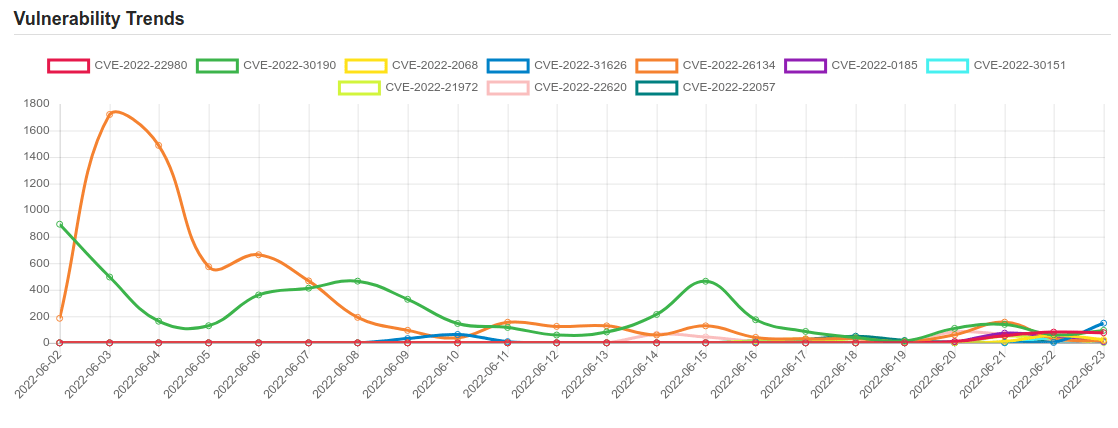Daily Vulnerability Trends: Fri Jun 24 2022

| CVE NAME | CVE Description |
| CVE-2022-2156 | No description provided |
| CVE-2022-25167 | Apache Flume versions 1.4.0 through 1.9.0 are vulnerable to a remote code execution (RCE) attack when a configuration uses a JMS Source with a JNDI LDAP data source URI when an attacker has control of the target LDAP server. This issue is fixed by limiting JNDI to allow only the use of the java protocol or no protocol. |
| CVE-2021-44228 | Apache Log4j2 2.0-beta9 through 2.15.0 (excluding security releases 2.12.2, 2.12.3, and 2.3.1) JNDI features used in configuration, log messages, and parameters do not protect against attacker controlled LDAP and other JNDI related endpoints. An attacker who can control log messages or log message parameters can execute arbitrary code loaded from LDAP servers when message lookup substitution is enabled. From log4j 2.15.0, this behavior has been disabled by default. From version 2.16.0 (along with 2.12.2, 2.12.3, and 2.3.1), this functionality has been completely removed. Note that this vulnerability is specific to log4j-core and does not affect log4net, log4cxx, or other Apache Logging Services projects. |
| CVE-2020-9715 | Adobe Acrobat and Reader versions 2020.009.20074 and earlier, 2020.001.30002, 2017.011.30171 and earlier, and 2015.006.30523 and earlier have an use-after-free vulnerability. Successful exploitation could lead to arbitrary code execution . |
| CVE-2021-22986 | On BIG-IP versions 16.0.x before 16.0.1.1, 15.1.x before 15.1.2.1, 14.1.x before 14.1.4, 13.1.x before 13.1.3.6, and 12.1.x before 12.1.5.3 amd BIG-IQ 7.1.0.x before 7.1.0.3 and 7.0.0.x before 7.0.0.2, the iControl REST interface has an unauthenticated remote command execution vulnerability. Note: Software versions which have reached End of Software Development (EoSD) are not evaluated. |
| CVE-2021-30983 | A buffer overflow issue was addressed with improved memory handling. This issue is fixed in iOS 15.2 and iPadOS 15.2. An application may be able to execute arbitrary code with kernel privileges. |
| CVE-2022-34305 | In Apache Tomcat 10.1.0-M1 to 10.1.0-M16, 10.0.0-M1 to 10.0.22, 9.0.30 to 9.0.64 and 8.5.50 to 8.5.81 the Form authentication example in the examples web application displayed user provided data without filtering, exposing a XSS vulnerability. |
| CVE-2022-21662 | WordPress is a free and open-source content management system written in PHP and paired with a MariaDB database. Low-privileged authenticated users (like author) in WordPress core are able to execute JavaScript/perform stored XSS attack, which can affect high-privileged users. This has been patched in WordPress version 5.8.3. Older affected versions are also fixed via security release, that go back till 3.7.37. We strongly recommend that you keep auto-updates enabled. There are no known workarounds for this issue. |
| CVE-2022-2042 | Use After Free in GitHub repository vim/vim prior to 8.2. |
| CVE-2022-22980 | A Spring Data MongoDB application is vulnerable to SpEL Injection when using @Query or @Aggregation-annotated query methods with SpEL expressions that contain query parameter placeholders for value binding if the input is not sanitized. |
| CVE-2022-30190 | Microsoft Windows Support Diagnostic Tool (MSDT) Remote Code Execution Vulnerability. |
| CVE-2022-2068 | In addition to the c_rehash shell command injection identified in CVE-2022-1292, further circumstances where the c_rehash script does not properly sanitise shell metacharacters to prevent command injection were found by code review. When the CVE-2022-1292 was fixed it was not discovered that there are other places in the script where the file names of certificates being hashed were possibly passed to a command executed through the shell. This script is distributed by some operating systems in a manner where it is automatically executed. On such operating systems, an attacker could execute arbitrary commands with the privileges of the script. Use of the c_rehash script is considered obsolete and should be replaced by the OpenSSL rehash command line tool. Fixed in OpenSSL 3.0.4 (Affected 3.0.0,3.0.1,3.0.2,3.0.3). Fixed in OpenSSL 1.1.1p (Affected 1.1.1-1.1.1o). Fixed in OpenSSL 1.0.2zf (Affected 1.0.2-1.0.2ze). |
| CVE-2022-31626 | In PHP versions 7.4.x below 7.4.30, 8.0.x below 8.0.20, and 8.1.x below 8.1.7, when pdo_mysql extension with mysqlnd driver, if the third party is allowed to supply host to connect to and the password for the connection, password of excessive length can trigger a buffer overflow in PHP, which can lead to a remote code execution vulnerability. |
| CVE-2022-26134 | In affected versions of Confluence Server and Data Center, an OGNL injection vulnerability exists that would allow an unauthenticated attacker to execute arbitrary code on a Confluence Server or Data Center instance. The affected versions are from 1.3.0 before 7.4.17, from 7.13.0 before 7.13.7, from 7.14.0 before 7.14.3, from 7.15.0 before 7.15.2, from 7.16.0 before 7.16.4, from 7.17.0 before 7.17.4, and from 7.18.0 before 7.18.1. |
| CVE-2022-0185 | A heap-based buffer overflow flaw was found in the way the legacy_parse_param function in the Filesystem Context functionality of the Linux kernel verified the supplied parameters length. An unprivileged (in case of unprivileged user namespaces enabled, otherwise needs namespaced CAP_SYS_ADMIN privilege) local user able to open a filesystem that does not support the Filesystem Context API (and thus fallbacks to legacy handling) could use this flaw to escalate their privileges on the system. |
| CVE-2022-30151 | Windows Ancillary Function Driver for WinSock Elevation of Privilege Vulnerability. |
| CVE-2022-21972 | Point-to-Point Tunneling Protocol Remote Code Execution Vulnerability. This CVE ID is unique from CVE-2022-23270. |
| CVE-2022-22620 | A use after free issue was addressed with improved memory management. This issue is fixed in macOS Monterey 12.2.1, iOS 15.3.1 and iPadOS 15.3.1, Safari 15.3 (v. 16612.4.9.1.8 and 15612.4.9.1.8). Processing maliciously crafted web content may lead to arbitrary code execution. Apple is aware of a report that this issue may have been actively exploited.. |
| CVE-2022-22057 | Use after free in graphics fence due to a race condition while closing fence file descriptor and destroy graphics timeline simultaneously in Snapdragon Auto, Snapdragon Compute, Snapdragon Connectivity, Snapdragon Industrial IOT, Snapdragon Mobile, Snapdragon Wearables |
| CVE-2022-26809 | Remote Procedure Call Runtime Remote Code Execution Vulnerability. This CVE ID is unique from CVE-2022-24492, CVE-2022-24528. |
If you like the site, please consider joining the telegram channel and supporting us on Patreon using the button below.




